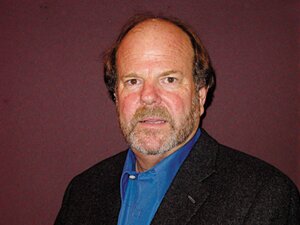| Rabbi Joel Oseran - on Liberal Judaism and the State of Israel |

|

|
|
Rabbi Joel Oseran, the Vice President of International Development of the World Union for Progressive Judaism (WUPJ), took time out of his busy schedule to speak to Jewish Times Asia. While on Sabbatical leave from 1997-1998, Rabbi Oseran also served as rabbi for the United Jewish Congregation of Hong Kong and assisted Progressive Jewish communities in Beijing, Shanghai and Singapore.
The World Union for Progressive Judaism is the international umbrella organisation of the Reform, Liberal, Progressive and Reconstructionist movements, serving 1,200 congregations with over 1.8 million members in 42 countries. Leading up to his current position with the WUPJ, Rabbi Oseran was ordained rabbi in 1976 from the Hebrew Union College (HUC). After ordination, Rabbi Oseran served as Director of Student Affairs at the Hebrew Union College in Jerusalem. He returned to the United States in 1981 where he served as Rabbi-Educator at University Synagogue in Los Angeles, California. In 1986 Rabbi Oseran made aliyah, with his wife and three sons, and joined the World Union Jerusalem headquarters as Director of Education where he served as Project Director for the first Progressive Movement School in Jerusalem. The project developed into the Tali Bayit V’gan primary school, which enrolls over 450 students. He received his Doctor of Divinity degree from HUC-JIR, Jerusalem, in 2001. As head of the World Union’s International Development, Rabbi Oseran directed the Progressive movement’s educational and religious programmes in the Former Soviet Union (FSU). The opening up Eastern Europe became of prime importance to the WUPJ’s agenda and their role in the FSU sent Rabbi Oseran on over fifty visits to travel to various parts of the region. He explains how while across Western Europe and the Americas, there is a history of organised progressive Judaism, in Eastern Europe the WUPJ essentially “created a Reform movement where it did not exist.” Similarly the congregations around Western and Central Europe were strengthened. He has also played a leading role in directing Progressive Judaism’s support for the Jewish community in Argentina during its times of crisis. Overall there has been a significant revitalisation of Reform Judaism across Latin America. His visit to Hong Kong happened to follow the recent well publicised statement by Rabbi Mordechai Eliyahu. When asked on Israeli radio what sin the 6 million Jewish victims of the Holocaust committed, he replied, “…the Reform movement began in Germany. Those reformers of religion started in Germany, and because it is said that the wrath of God does not distinguish between the righteous and the evil ones – this was done.” Rabbi Oseran reflected that he is confronted with this type of statement routinely, but yet it never ceases to amaze him. He is not immune from the element of shock that others encountered when hearing that this prominent and central figure in Israel has blamed the Holocaust on the victims themselves for their sins of “reform”. There was sadness in his eyes when he spoke of this most recent attack and a concern over what message this sends. Worldwide, Jewish groups have spoken out against Rabbi Eliyahu’s remark. Israel’s Prime Minister, Ehud Olmert, even directly responded to the WUPJ leadership’s personal call for the prime minister to take action. Prime Minister Olmert stated that, “The Reform Movement is a vital and vibrant part of modern Judaism, and the Government and people of the State of Israel admire your contribution to Jewish life in Israel and the Diaspora.” This statement alone is significant to the strength of the movement worldwide. The debate over ‘who is a Jew’, in Israel and in the Diaspora, has consequences. There is fear that the worldwide Jewry, with a strong Progressive majority, will find it difficult to develop a personal connection with Israel based on this issue. Additionally, he explains that the status of the Reform movement in Israel can have an impact on the relationship of the United States with Israel. He continually stressed the reality of the importance of Israel’s relationship with the United States. With respect to the status of the Reform Movement in Israel, Rabbi Oseran explains that marriages performed in Israel by Reform rabbis are not recognised by the civil authorities. Couples who wish to be married by a Reform rabbi in Israel are not prevented from doing so, but in order for their marriage to be recognised by the civil authorities, they must undergo an additional civil ceremony abroad. Foreign civil marriages are accepted by Israeli authorities. Conversions performed by the WUPJ, in Israel, are likewise not recognised by religious or state authorities Despite the daily struggles over recognition, legal status, ‘who is a Jew’ and even ‘who is a Rabbi’, Rabbi Oseran stands for the Reform Movement’s unfaltering, complete and unconditional support of Israel and their essential connection to the Holy Land. In 1973, the World Union for Progressive Judaism moved its headquarters to Jerusalem and they require that their Rabbinic students spend their first year of study in Israel. They strongly encourage members of their Diaspora youth movement to visit Israel through a variety of programming. Today there are now approximately twenty-five Progressive congregations in Israel and two kibbutzim. The HUC, in Israel, boasts enrollment of 37 Israelis in their Rabbinic Ordination program. Oseran further explains that there an increasing number of Israeli secular families that are finding that a complete secular identity is not meeting their needs. They are beginning to understand that their Jewish identity is more complex and needs to be fostered. In response, there is an increase in secular schools that are expanding their cirruclum and turning to the WUPJ for assistance. In Israel, Rabbi Oseran remarks that the Reform movement is “small in terms of a numerical count but very much present in terms of its impact in society.” In addition to the battle for legal recognition and status of the movement itself, they seek recognition of other forms of non-Orthodox Judaism as well and have been a force in promoting social justice and religious pluralism in Israel and around the world. Rabbi Oseran also explains the importance of tikkum olam to the heart of Reform Judaism. They seek to improve the global community, through international social action. They promote a strong humanitarian agenda that seeks to feed the hungry, help victims of terrorism, aid the poor, settle new Olim in Israel, participate in meaningful interfaith dialogues, fight gender inequality and preserve the environment. The relationship between the Reform movement and Israel and the Diaspora is complex and indivisible. Oseran points to the large number of largely secular Israelis that backpack and trek around the world. He explains that this is a good thing for them and the world. Israeli youth gain by experiencing the world and connecting with Jews of diverse backgrounds and in turn the world gets to know Israel through its people rather than its politics. Overall, Oseran reminded Hong Kong that, “Israel is central to the Progressive Movement. We, as Jews, all need to have a strong and a personal relationship with Israel.” |

















